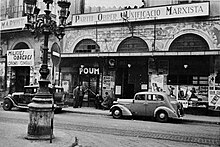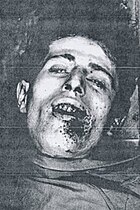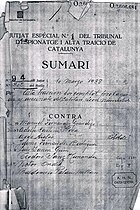Leon Narwicz
Leon Narwicz | |
|---|---|
| Born | 1911 unknown, Ukraine, Russian Empire |
| Died | 1938 Barcelona, Spain |
| Known for | soviet agent |
| Political party | French Communist Party |
Leon Narwicz (Russian: Леон Нарвич, Лев Нарвич), also Leon Narvich,[1] León Druan (1911–1938) was a radical left-wing political militant and revolutionary of mixed Polish, Jewish and Russian background. He was related to the Communist movement in Russia, Poland, Belgium and France. He took part in the Spanish Civil War as member of the International Brigades, serving in French or/and Polish units as a political commissar. He was acting as agent of the Soviet intelligence NKVD and the Republican military counter-intelligence Servicio de Información Militar. His primary task was penetration into and subversion of POUM groups in Catalonia; Narwicz was possibly related to detention of Andreu Nin. He was shot by a Trotskyist hit squad in Barcelona. He is known mostly in relation to internal conflicts within the Republican coalition during the war, and especially in relation to Soviet Communist attempt to dominate other political currents.
Family, childhood, youth[edit]

There are few details available as to Narwicz's family; his parents are not known by name.[2] In the early 1910s they lived in the Russian Empire, in Ukraine. According to some sources they formed part of the Russian Jewry,[3] though in historiography Narwicz might be referred to also as a Russian[4] or a Pole.[5] His father was involved in revolutionary work and following the Bolshevik takeover in Russia he was posted to Belarus, where he served as a commissar responsible for ensuring foodstuff delivery quotas. In 1921 he was killed, according to his son by the kulaks; perhaps the crime was related to land collectivisation in the USSR.[6]
It is not clear who was bringing up Leon following the death of his father; according to unclear sources he led a nomadic life, perhaps as an adolescent vagrant. In the mid-1920s as a teenager he happened to be in Odessa. In unclear circumstances he boarded a ship and sailed to Danzig, from where he moved to Poland; he settled in Grodno. This is where he got engaged in workers’ movement, taking part in rallies of the unemployed and getting in touch with the illegal Communist Party of Poland. Arrested in 1926, he spent at least 3 months behind bars. In the late 1920s he moved to Germany, where he reached the age of majority.[7]
Revolutionary[edit]

Until 1931 Narwicz was employed in the International Yachting Club in Bremen. He quit to join crew of merchant ships, operating from Germany on long-distance routes, e.g. to Africa. In 1932 he moved to Belgium and was soon noted as engaged in strike movement of miners in the coal-basin of Borinage. Detained by the police and having unclear sanctions administered against him, Narwicz left for Antwerp; he was secretary to an illegal workers organisation, grouping mostly Russian and Ukrainian migrants. He was detained again, it is not known whether sentenced. He spent 8 months in jail and was released thanks to amnesty.[8]
Unable to find work in Belgium, Narwicz moved to France. None of the sources consulted provides information on his early employment and residence, some time later he settled in Paris. He joined th French Communist Party and in the mid-1930s remained its very active member, mostly in a section grouping Russian migrants.[9] He was active also in Homebound Union (Союз возвращения).[10] It was an organization, set up in the mid-1920s, which catered to pro-Soviet Paris Russians; financed and controlled by the USSR, de facto it was a platform enabling operations of Soviet secret services, especially foreign intelligence.[11] At the time Narwicz lived with a Russian woman, whom he used to introduce as his wife Emma.[12]
IB volunteer: frontline service[edit]

In early August 1936 PCF sent Narwicz to Spain. His initial role is unclear; it is known that he fought on the Aragon front, near Huesca. He was assigned to a machine-gun company, in support of a Republican artillery unit. In the autumn of 1936, following launch of the International Brigades scheme, he was assigned to their structures as a political commissar. In November 1936 he took part in fightings in Casa de Campo, at the ouskirts of Madrid.[13]
Narwicz's exact service assignement is subject to doubt. Some sources claim he was member of the "Paris Commune Battalion" in the francophone XIV Brigade.[14] Other maintain that he rather formed part of "Mickiewicz Company"[15] in the early XIII Brigade, before it was re-formatted as a Polish-Slavic unit. There are also notes about his membership in Mickiewicz Battalion in the XIII Brigade.[16] Some recollections present him as a political commissar of an unidentified "trotskyist battalion".[17] According to one historian he was not a political commissar, but a commander of the Mickiewicz Company and as such took part in the battle of Brunete in the summer of 1937.[18] At some point he was wounded in the lungs, not clear whether during this battle or during some other engagement.[19]
IB volunteer: spy and agent[edit]

In the spring of 1937 – most likely during break in-between two periods of frontline service– Narwicz remained in Barcelona. British volunteers later suspected him of spying on the Independent Labour Party centre, which included copying confidential and personal documents.[20] Before so-called May Days he supposedly got in touch with POUM leaders, including Andreú Nin;[21] he posed as a Russian communist opposed to the Stalin dictatorship.[22] According to some historians already at the time Narwicz had been operating either as agent or as functionary of NKVD.[23] He was later suspected of having been involved in setting a trap against Nin, detained in the summer of 1937.[24] In October 1937 he obtained sick leave from International Brigades and travelled to Paris. In the French capital he renewed his links to Alliance of Friends of the Soviet Fatherland, successor to the Homebound Union.[25]
Either in late 1937 or in early 1938 Narwicz returned to Spain. He was not seconded to line, but received rather orders to stay in Barcelona. Formally he was still member of the 4. Battalion of the XIII. Brigade in the rank of a captain.[26] At the turn of 1937 and 1938 his key task was to penetrate into and subvert the supposed Trotskyist conspiracy, especially in the XII. and XIV. Brigades. As "León Druan" he infiltrated Sección Bolchevique-Leninista de España (SBLE), a Trotskyist organisation active in Barcelona; he reported directly to one of International Brigades leaders, Luigi Longo. Thanks to his intelligence info the republican security arrested some 40 members of SBLE and POUM.[27]
IB volunteer: death[edit]

Among the Barcelona Trotskyists Narwicz was identified as an undercover operative thanks to a photograph, published in the official Republican press; with his actual surname in the capture, he featured along the Communist commander and well-known Stalinist, Enrique Lister.[28] POUM and SBLE leaders which still remained at liberty got wind that they were most likely being infiltrated by Soviet and republican special services; they also started to speculate that there was a link between Narwicz's earlier frequent visits in the headquarters and the disappearance of Nin.[29] Claiming that he was to pass some important documents, one of the militants asked Narwicz for a meeting.
On the evening of February 10, 1938 Narwicz was found dead at Calle Legalidad in Barcelona; he has been shot a few times (including in the head), while his personal belongings, including documents, money and a pistol, remained on him.[30] International Brigades services along the Republican services commenced investigation, which shortly produced detention of 3 individuals.[31] Tribunal d'Espionatge i Alta Traició de Catalunya, one of revolutionary jurisdiction courts set up during the war, following a brief trial condemned all of them to death penalty.[32] Eventually they have not been executed and following a year they left Spain. Though there were some further arrests following,[33] neither the case of presumed spying nor the case of assassination have been fully clarified. However, many historians claim unequivocally that Narwicz has been shot in revenge for Nin.[34]
In historiography[edit]

According to one theory Narwicz has not perished in Spain, but was recalled to the USSR and died in 1939 in another wave of Stalinist purges. As in Catalan archives there is extensive documentation from the trial of his supposed assassins, this theory is not viewed as sustainable.[35] This set[36] contains testimonies of the accused and other police data. The documents in question – plus minor fragmentary pieces in recollections published by various people later – remain the only source of information on Narwicz. So far no historian found any documents related to Narwicz in Russian, Polish,[37] German, Belgian or French archives.
In the broad Spanish public discourse Narwicz re-appeared on exceptional basis in 1963, during the trial against Julian Grimau; the latter was suspected of having tortured individuals charged with murdering Narwicz in 1938. Except one para-documentary article[38] and a pamphlet on Stalinist repressions in Barcelona[39] there is no monograph dedicated to Narwicz. In the Spanish historiography he is marginally mentioned in relation either to the death of Nin or to the process of Grimau.[40] In the Russian historiography he appears in discourse on NKVD activity in Spain.[41] In the Polish historiography he is almost entirely absent. During the Communist era he was barely mentioned in hagiographic works on the International Brigades, always in relation to his frontline service.[42] Currently he might be mentioned in scientific works[43] and popular publications, though against the NKVD background; some works pursue entirely erroneous narrative.[44]
See also[edit]
Footnotes[edit]
- ^ in Spanish and Catalan transcriptions his surname appears – also in official juridical documents related to the trial after his death – in varius spelling versions, compare Agustín Guillamón, El terror estalinista en Barcelona, Valencia 2018, pp. 20, 69-73, 84 and passim. On the cover of the court file, reproduced below, the surname is spelled "Narrvirtsch". Also in western-European historiography and broad public discourse the surname might appear as Narvitch, Narvitsch, Narwitsch, Narwich etc., though the version which prevails is Narvich
- ^ in Russian sources Narwicz appears as Леон or Лев, but never with his отчество, a patronymic which would help to identify his father
- ^ „из эмигрировавших из России евреев”, Игорь Симбирцев, Спецслужбы первых лет СССР, 1923-1939, Москва 2010, ISBN 9785952438385, p. 225
- ^ „militar ruso, el capitán León Narvitch” Ramón Tamames, España 1931-1975. Una antología histórica, Madrid 1980, ISBN 9788432056598, p. 221
- ^ “le Polonais Léon Narwicz”, Agustin Guillamón, Portraits de militants révolutionnaires, s. l. 2014, p. 23
- ^ Daniel Grason, Narvitch Léon, [in:] Le Maitron. Le Dictionnaire Biographique Mouvement Ouvrier. Mouvement Social service 2011 [last modyfication 2021]
- ^ Grason 2011
- ^ Grason 2011
- ^ Grason 2011
- ^ there are some wartime recollections about his „earlier activity” in Homebound Union, Дмитрий И. Рублев, Русские анархисты в Испанской гражданской войне 1936 - 1939, [in:] Radosław Skrycki (red.), Studia z dziejów anarchizmu. Wojna domowa w Hiszpanii (1936–1939), Chojna 2018, ISBN 9788394063696, p. 192
- ^ А. Ю Вовк, Союз Друзей Советской Родины, Париж, улица де Бюси, 12, [in:] Диалог со временем 74 (2021), pp. 363-367
- ^ Побережник Семен Яковлевич, Крутые перевалы, Москва 1975, p. 87
- ^ Grason 2011
- ^ Grason 2011
- ^ Marcin Michcik, Polacy w Hiszpanii podczas wojny domowej, [in:] Wiadomości 14/5 (1950), p. 7
- ^ Dariusz Zalega, Obrońcy Republiki. Ochotnicy z Górnego Śląska w wojnie domowej w Hiszpanii [PhD thesis accepted at Uniwersytet Śląski], Katowice 2022, p. 112
- ^ Рублев 2018, p. 192
- ^ Lech Wyszczelski, Dąbrowszczacy, Warszawa 1986, ISBN 8603650481216, p. 36
- ^ Grason 2011
- ^ Giles Tremlett, The International Brigades, Fascism and the Spanish Civil War, London/New York 2021, ISBN 9781526644541, p. 299
- ^ Двадцать два 59-62 (1988), p. 136
- ^ Fernando Hernández Sánchez, Guerra o revolución el Partido Comunista de España en la Guerra Civil, Barcelona 2010, ISBN 9788498921519, p. 225
- ^ at times he is referred to as "Orlov's agent", see В. Н. Степанков, Александр В. Киселев, Эдуард Шарапов, Чекисты Сталина, Москва 2006, ISBN 978576544606, p. 520
- ^ А.И., Прохоров, Д.П. Колпакиди, Д. П. Прохоров, КГБ спецоперации советской разведки, Санкт-Петербург 2000, ISBN 9785739009906, p. 135
- ^ Grason 2011
- ^ Tremlett 2021, p. 299, Wyszczelski 1986, p. 36
- ^ Alberto Laguna, El crimen de la calle Legalidad: muerte de un infiltrado, [in:] Guerra en Madrid service, 2019
- ^ it is not clear which newspaper was in question. In Spanish hemerotecas, which enable access to digitalised versions of Spanish press from the war period, Narwicz is not mentioned, let alone photographed, see Hemeroteca Digital and Prensa Historica
- ^ Grason 2011
- ^ he was buried in a common grave, not identified until today
- ^ Adolfo Carlini alias Doménico Sedran, Manuel Fernández Grandizo, Jaime Fernández Rodríguez. According to other sources Narwicz was executed by Lluis Puig and Alberto Masó, among the arrested there are also Adolfo Carnini, Jaime Fernández and Teodoro Sanz, see Laguna 2019
- ^ Enric Juliana, Aquí no hemos venido a estudiar, Barcelona 2020, ISBN 9788417623609, p. 188
- ^ F. Javier Puerto Sarmiento, Ciencia y política. José Giral Pereira (Santiago de Cuba, 1879-México D.F., 1962), Madrid 2015, ISBN 9788434022676, p. 463
- ^ “Narwicz, an officer in the International Brigades, had infiltrated the POUM posing as a Russian dissident; he was executed by a POUM action squad in revenge for death of Nin”, Andy Durgan, With the POUM. International volunteers on the Aragon Front (1936-1937), [in:] Revista Internacional de la Guerra Civil 8 (2018), p. 158
- ^ Laguna 2019
- ^ in the archival fond of Jutjat Especiál No 1. del Tribunal D’Espionatge i Alta Traició de Catalunya
- ^ axcept his written microfilmed account from early 1936 frontline days, unclear when and in what circumstances written, currently stored in the Warsaw AAN archive, section CA KC PZPR, fond 182, roll 32/1 no 75, referred after Seweryn Ajzner, Pierwsi polscy uczestnicy wojny domowej w Hiszpanii, [w:] Kwartalnik Historyczny 92/4 (1985), p. 387
- ^ J.A. [Juan Andrade], L’Affaire León Narvitch, [in:] Cahiers León Trotsky 3 (1979), pp. 133-135
- ^ Guillamón 2018
- ^ Juliana 2020, p. 188, Puerto Sarmiento 2015, p. 463, Hernández Sánchez 2010, p. 225
- ^ Степанков, Киселев, Шарапов 2006, p. 520, Эдуард Шарапов, Наум Эйтингон -карающий меч Сталина, 2003, ISBN 9785765431214, p. 57, Симбирцев 2008, p. 225
- ^ Michał Bron, Polacy w wojnie hiszpańskiej, 1936-1939, Warszawa 1967, p. 252, Ajzner 1985, p. 387, Wyszczelski 1986, p. 36
- ^ Zalega 2022, p. 112
- ^ „Jeszcze inne źródło podaje, że wraz z Ninem republikańskie organy bezpieczeństwa zatrzymały doradcę sowieckiego kapitana Lwa Narwicza, który przesadnie zaangażował się po stronie trockistów”, Tadeusz Zubiński, Wojna domowa w Hiszpanii, Poznań 2015, ISBN 9788371779732, p. 406
Further reading[edit]
- J.A. [Juan Andrade], L’Affaire León Narvitch, [in:] Cahiers León Trotsky 3 (1979), pp. 133–135
- Agustín Guillamón, El terror estalinista en Barcelona, Valencia 2018
- Jaume Moreno, L’Afer Narwicz, [in:] L'Avenç. Revista d'Història 355 (2010), pp. 46-49
External links[edit]
- 1911 births
- 1938 deaths
- Assassinated revolutionaries
- Assassinated spies
- Foreign volunteers in the Spanish Civil War (Republican faction)
- French Communist Party members
- International Brigades personnel
- Interwar-period spies
- Jewish communists
- Military personnel killed in the Spanish Civil War (Republican faction)
- NKVD officers
- Prisoners and detainees of Belgium
- Prisoners and detainees of Poland
- Polish communists
- Polish people of the Spanish Civil War
- Polish prisoners and detainees
- Polish revolutionaries
- Polish soldiers
- Russian communists
- Russian revolutionaries
- Soviet spies

